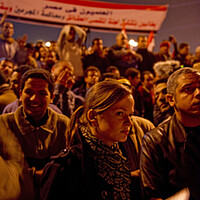History divides Bosnia once again, this time over World War I centenary
Loading...
| Sarajevo, Bosnia
On Saturday, Bosnia and Herzegovina will mark the 100th anniversary of the assassination that began World War I. But in a sign of the deep divisions that persist nearly two decades after the end of the war here, the country will not do so in unity.
The Federation of Bosnia and Herzegovina, one of the two autonomous entities that make up the country, will commemorate the centenary with events in Sarajevo, where Gavrilo Princip shot and killed Archduke Franz Ferdinand of Austria and his wife. The Serbian Republic, meanwhile, has declined to participate in the Sarajevo events, holding its own commemoration instead in Visegrad, a town in the Serb-dominated entity.
Serbian officials say they believe Princip, whom they consider a national hero, will be portrayed as a terrorist by the federation, which is populated mostly by Bosniak Muslims and Croats. But analysts and some citizens of both entities say politicians are using the historical event as another chance to perpetuate division.
“This is, as most of these issues in Bosnia are, a periodic performance,” says Jasmin Mujanovic, a visiting scholar at the Harriman Institute at Columbia University who studies Bosnia. “It's an opportunity for political entrepreneurs to peddle the same old narrative about unreconciled differences between the communities they claim to represent.”
To be sure, there are differing views of Princip, a Bosnian Serb whose assassination of the heir to the Austro-Hungarian throne in 1914 set off events that culminated in the beginning of the war that was to end all wars. Many Serbs consider him a laudable figure who fought against an occupying power. Many Bosniaks and Croats disagree. But many ordinary citizens say they don't feel strongly about the event that occurred 100 years ago.
In predominantly Serb East Sarajevo, pensioner Slobodan Bubnjevic stopped to watch workers busily paving, painting, and landscaping a new city park to be named after Princip this weekend. He said he thought of the assassin in a positive light, but didn't put too much stock in the decisions to mark the anniversary separately.
“Politicians are using nationalism to get votes, both in the Federation and [the Republic of Serbia], while the people don't have good lives,” he said.
In the park, Ljubisa Cosic, the mayor of New East Sarajevo, proudly pointed out the life-size chess board, open air theater, fountain, and area where a playground would be built. Overlooking the playground area was the pedestal where the 6-foot statue of Princip, created by a Belgrade sculptor, would be placed. His name was already engraved on the block in Cyrillic script.
The statue was intentionally placed to face the playground. “We are connecting history, of which we are very proud, with the future, our children,” said the mayor. “With this park, it is not our intent to offend anyone. But most people who live here are Serbs. We see [Princip] as a hero. We feel that after 100 years the man deserves a monument in his country.”
Mr. Cosic says Serb leaders believe the commemoration of the event in Sarajevo will “try to show Serbs and Gavrilo Princip as aggressors, who committed an act that caused many victims. We can't avoid the fact that we have different political views, so it's better to mark the anniversary in different ways.”
Back in Sarajevo, where even an academic conference called “The Great War: Regional Approaches and Global Contexts” became a political battlefield, the Museum of Saraejvo, on the corner where the assassination took place, hung a banner with portraits of both Princip and Ferdinand.
Jasmin Medic, who has a master's degree in history and works in a local civil society organization, said Serb politicians are using the anniversary to score political points against the federation. As a historian, he lamented the politicization of history, which he calls a pervasive problem here. “I think most people have no idea what actually happened, and they're giving their opinions based on the politicians from their ethnic groups,” he said.
Near the infamous street corner, Alma Hanic sat next to the Miljacka River as tour groups stopped to take photos of the site. The young call center worker said she had no strong feelings about Princip or the assassination, and that Bosnians have enough current-day problems to worry about without fighting about history. The events surrounding the centenary, she said – which include a performance by the Vienna Philharmonic Orchestra in the historic and recently restored Sarajevo National Library – are a good chance for Bosnians to distract themselves from those problems.





